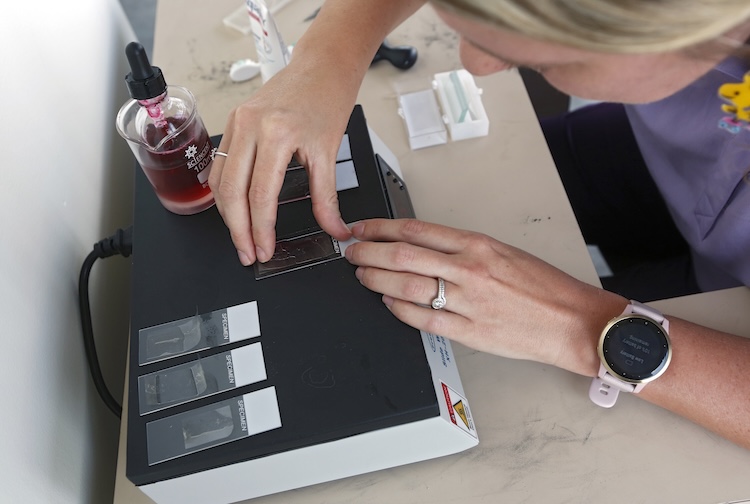Children’s Hospital of Richmond at VCU establishes Central Virginia’s first pollen counting station
Reliable pollen counts will help allergy sufferers and medical providers identify and anticipate triggers.
May 13, 2025.jpg) Children’s Hospital of Richmond at VCU has become a National Allergy Bureau designated pollen counting station. (Eva Russo, Children’s Hospital of Richmond at VCU)
Children’s Hospital of Richmond at VCU has become a National Allergy Bureau designated pollen counting station. (Eva Russo, Children’s Hospital of Richmond at VCU)
By Kate Marino
A new pollen counting station run by Children’s Hospital of Richmond at VCU provides data to help allergy sufferers and their medical teams better manage troublesome symptoms. Its location is key, as the Asthma and Allergy Foundation of America ranks Richmond the eighth most challenging city in the country to live with seasonal allergies.
.jpg) The air sampler is on top of Adult Outpatient Pavilion in downtown Richmond, Virginia. (Eva Russo, Children’s Hospital of Richmond at VCU)
The air sampler is on top of Adult Outpatient Pavilion in downtown Richmond, Virginia. (Eva Russo, Children’s Hospital of Richmond at VCU)
There are more than 80 National Allergy Bureau (NAB) designated pollen counting stations throughout North America , until now, the closest one to Richmond was in Washington, D.C.
“The air sampling in Washington, D.C. is likely to have large variability from the air space here in Central Virginia,” said Wei Zhao, M.D., professor and chief of allergy and immunology at CHoR. “It’s important that we are accurately identifying and measuring the pollen grains in our area so we can have the most relevant environmental testing and targeted immunotherapy.”
Pollen counting and collection process
An air sampler, located atop VCU Health’s Adult Outpatient Pavilion in downtown Richmond, flows freely with the natural movement of the wind to collect a continuous sample. The specific location was selected because it is free of obstructions, such as a helipad, that could interfere with natural air flow and skew the sampling.
Jessica Hess, CPNP, a member of CHoR’s allergy and immunology team, attended in-depth courses and completed a series of testing to become a NAB certified pollen counter. Hess unloads the air sampler once per week, studies what was collected under a microscope and identifies different pollen grains by their size and key characteristics.
“Each pollen season you have different types of pollen, so that’s something I can view and identify under a microscope. They do look different,” Hess said. “It’s the most accurate count you can obtain. Some of our patients may have just one pollen type they are allergic to so it’s helpful to know when it’s actually here in our airstream so we can align their treatment.”
The pollen data is reported into a database operated by the NAB. Media and the public can access the data by setting up an account. There is also an option to receive email alerts when new readings are available.
Promise for the future of allergy relief in Richmond
“Becoming a certified pollen counting station allows us to better guide management of allergic conditions and conduct further research. There is great potential for creating immeasurable impacts to our community’s health and overall well-being,” Zhao added.
Zhao, Hess and their team anticipate the counting station will also enable them to accurately identify the start, peak and end to pollen season in the Richmond area. This long-term initiative will require approximately 3 years of data to correlate trends. It will also provide a better understanding of climate change as it relates to allergies.
“Our climate is changing rapidly, resulting in shifts in precipitation patterns, more frost-free days, warmer seasonal air temperatures and more carbon dioxide in the atmosphere which will affect how our seasonal pollen interacts in the environment,” Zhao said.

Jessica Hess, CPNP, a nurse who is part of CHoR’s allergy and immunology team, became a NAB certified pollen counter. (Eva Russo, Children’s Hospital of Richmond at VCU)
A version of this story was originally published by Children's Hospital of Richmond at VCU




